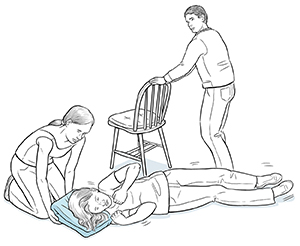Safety During a Seizure
Safety during a seizure
Let family and friends know what to expect and how to react when you have a seizure. This helps keep them calm and you safe. All seizures should be treated with care. But seizures that cause you to lose consciousness (tonic-clonic seizures) need more attention. Think about wearing a medical alert bracelet in case you are not around family members. This can alert other people to your condition and provide any special instructions. Here are some tips for loved ones.
What to know
Seizures typically last less than 3 minutes. But it will feel like it's longer. People recover safely from most seizures. During a tonic-clonic seizure, the person may appear to stop breathing or turn slightly blue. This may be scary for you, but try to stay calm. Afterward, the person may be tired, confused, and achy. They may need to sleep for several hours to fully recover.
What to do
During any seizure, stay with the person until it's over. Note the time when the seizure starts and ends. Don’t try to stop the seizure. During a tonic-clonic seizure, also do the following:
-
Move hard or sharp objects out of the way.
-
Lay the person on a flat surface and turn them on their side.
-
Place a flat, soft object under their head.
-
Don’t try to restrain the person. Both of you could get hurt.
-
Don’t put anything in the person’s mouth. The person can’t swallow their tongue, and you risk breaking their teeth or being bitten.
-
Don’t give the person medicines during a seizure, unless you’ve been trained by a healthcare provider.
-
Speak quietly to the person as they recover.

There is no need to call 911 if the person has a well-known cause of the seizures (such as epilepsy) and the seizure is very typical. If you are not sure or the person's condition is not known, call 911.
Call 911
Call 911 if any of these occur:
-
The seizure lasts longer than 5 minutes
-
The person isn't conscious between 2 seizures
-
Several seizures happen in a row
These things could mean the person has status epilepticus. This is a medical emergency. Hospital treatment for this condition includes benzodiazepine medicines given by IV (intravenous). A form of this medicine (a rectal diazepam gel) may be prescribed for at-home use.
Other causes of seizures and situations that need immediate medical care include:
-
The person has diabetes
-
The person has a brain infection
-
The person has heat exhaustion
-
The person is pregnant
-
Poisoning is known or suspected
-
The person has low blood sugar
-
A seizure happens after or during a high fever
-
A head injury immediately after or within a few days after the injury happened
-
Multiple seizures happen in a short period of time
-
The person stops breathing
-
A seizure that happens in water
-
The person hit their head during a seizure and becomes difficult to wake up, is vomiting, or complains of blurry vision
-
It's the first time a seizure happens
-
It's different than the typical seizures for that person
-
The person is difficult to arouse after the seizure
-
Alcohol or drug abuse
-
Alcohol or drug withdrawal